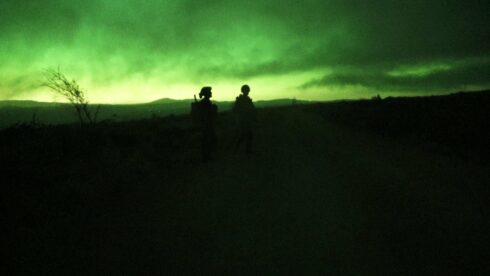The Israeli Defense Forces (IDF) announced on July 9 that it had carried out several raids in southern Lebanon recently, locating and destroying Hezbollah weapon depots and other infrastructure belonging to the group.
In one of the raids in the Jabal Blat area, soldiers of the 300th “Baram” Regional Brigade located a Hezbollah compound that included a weapons depot and firing positions. According to the military, the troops demolished the site.
During another raid, the IDF said that reservists of the Oded Brigade located weapons hidden in a forested area near the town of Labbouneh, including a multiple rocket launcher, a machine gun, and dozens of explosive devices. The weapons were also destroyed.
The military added soldiers to an underground site used by Hezbollah to store weapons in the same area, and it was demolished by combat engineers.
The “special, targeted” raids were launched “following intelligence information and the identification of Hezbollah weapons and terrorist infrastructure in several areas of southern Lebanon,” and were intended to “prevent Hezbollah from reestablishing itself in the area,” the military said in a statement.
Separately, the IDF announced that a Hezbollah commander was killed in an Israeli drone strike in southern Lebanon a day earlier.
The strike in the town of Babliyeh killed Hussein Ali Muzhir, who the IDF said was the commander of Hezbollah’s firepower in the Zahrani River area, under the group’s Badr regional division.
“As part of his role, Hussein advanced numerous [rocket] fire attacks toward the State of Israel and IDF troops. Additionally, recently he was involved in attempts to restore the artillery capabilities of the Hezbollah terror group in southern Lebanon,” the military said in a statement.
The IDF said that the actions of Muzhir “constitute a blatant violation of the understandings between Israel and Lebanon.”
Israel strikes have reportedly killed more than 180 members of Hezbollah since a ceasefire with Lebanon brokered by the United States came into effect on November 27.
In addition, the IDF has refused to completely withdraw from southern Lebanon in line with the agreement, keeping troops at five strategic posts in the region.
On July 7, United States envoy Thomas Barrack said he was “unbelievably satisfied” by the response of the Lebanese government to a request to disarm Hezbollah, part of a process meant to remove the need for Israel to take military action in Lebanon.
“It’s thoughtful, it’s considered. We’re creating a go-forward plan,” he said.
However, Hezbollah’s Secretary-General Naim Qassem affirmed in an interview with Lebanon’s Al-Mayadeen TV on July 8 that the group would not give up its weapons.
Addressing recent Israeli strikes on Lebanon, Qassem threatened that the “resistance will not wait forever. There are limits.”
“There is no third option between victory and martyrdom. We do not have surrender as an option,” the leader said.
All in all, the IDF will likely escalate further against Hezbollah in coming months. Israel could in fact go as far as renewing the war on Lebanon, especially if a ceasefire was reached in the Gaza Strip.
_______________________________________________________________________________________________________________________
SouthFront: Analysis and Intelligence
NOW hosted at southfront.press
Previously, SouthFront: Analysis and Intelligence was at southfront.org.
The .org domain name had been blocked by the US (NATO) (https://southfront.press/southfront-org-blocked-by-u-s-controlled-global-internet-supervisor/) globally, outlawed and without any explanation
Back before that, from 2013 to 2015, SouthFront: Analysis and Intelligence was at southfront.com






